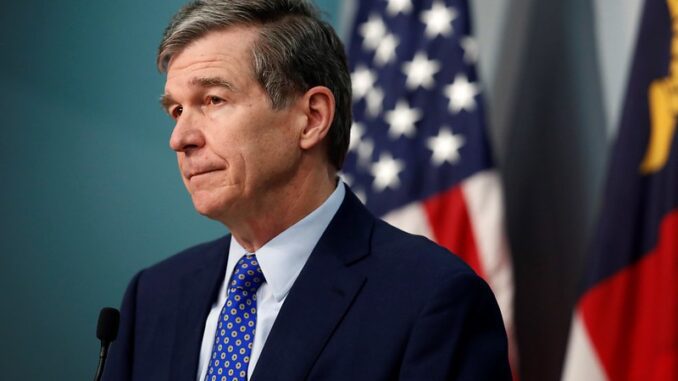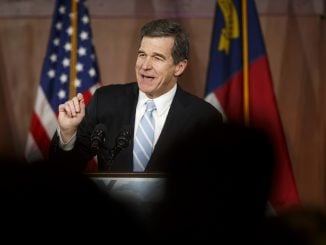
RALEIGH — North Carolina Democratic Gov. Roy Cooper added veto No. 66 to his list of record-breaking vetoes with his rejection of Senate Bill 326, The Election Day Integrity Act.
Since veto power was granted to North Carolina governors in 1996, Cooper’s four predecessors had only issued 35 vetoes combined.
“The legislature ironically named this bill ‘The Election Day Integrity Act’ when it actually does the opposite,” Cooper wrote in his veto message. “Election Integrity means counting every legal vote, but this bill virtually guarantees the opposite.”
Cooper’s message appears to conflict with much of the content of the bill. One of the key provisions is shoring up the date ballots are accepted to Election Day instead of continued acceptance three days later. Additionally, not only does Senate Bill 326 count every legal vote, but the bill would also have extended the Election Day deadline for absentee by-mail ballots.
Except for military and overseas voters, the bill would have added hours for those applications and mail-in absentee ballots to be returned to boards of election, going from the current 5 p.m. deadline to 7:30 p.m. on the day of the election, regardless of postmark.
Additionally, If the N.C. State Board of Elections were to extend the closing time of the polls, ballots could be received and counted by the extended closing time.
During the 2020 election, ballots were to be accepted nine days beyond Election Day, causing delays and controversy in certifying race results. The nine-day extension was the result of a secret settlement entered into by the N.C. State Board of Elections (NCSBE), N.C. Attorney General Josh Stein, and Democratic-aligned activist groups. Dubbed a “collusive settlement agreement” by lawmakers, it made the changes to ballot-acceptance dates just 41 days before Election Day and while absentee voting was already underway.
“Election Day should be the election deadline because it boosts confidence in elections to have results as close to the end of voting as possible. Election Day is the election deadline in plenty of Democrat-run states, yet Gov. Cooper and Democrats keep peddling this bizarre theory that the policy is an attempt at voter suppression,” the bill’s primary sponsor, state Sen. Paul Newton (R-Cabarrus) said in a statement.
The statement from Newton notes that the bill would have aligned North Carolina with “Democratic-controlled states like Colorado, Hawaii, Maine, Oregon, Rhode Island, Vermont, and others,” that have “identical policies” recognizing Election Day deadlines for ballots.
Newton went on to ask, “Will the press finally ask Gov. Cooper or Democratic legislators whether they believe Democrats in states with an identical policy are vote suppressors, or will they continue carrying water for the Democratic Party?”
House Speaker Tim Moore (R-Kings Mountain) also issued a statement, noting that “Senate Bill 326 would further secure the integrity of our elections by requiring absentee ballots to be received by Election Day, rather than three days later.”
“Sadly, this veto will undermine North Carolina voters’ confidence in the outcome of future elections,” Moore said. “Most states already have the same requirement for ballots to be received in a timely manner. Why shouldn’t North Carolinians be given the same confidence in our Election Day process?”
Senate Bill 326 is one of multiple election-related bills that were considered by legislative committees in the last weeks of November. One of the other bills, Senate Bill 725, was also passed by the General Assembly and sent to Cooper for signature on Dec. 1.
Senate Bill 725, titled Prohibit Private Money in Election Admin., bars county commissioners, as well as the state and county boards of elections, from accepting private funds, either directly or indirectly, to hire individuals on a temporary basis or for use in the processes of conducting elections.
North State Journal reported on outside money in North Carolina elections from the Schwarzenegger Institute. The former California governor’s organization dropped almost $190,000 into 10 counties prior to the November 2020 election.
Additionally, Mark Zuckerberg, through the Center for Tech and Civic Life (CLTC), funneled over $419 million into around 2,500 counties in 49 states during the 2020 election cycle.
Some 35 North Carolina counties received CLTC funds and the state received over $5.395 million overall. The N.C. State Board of Elections and Wake County received a million each and Durham received over $1.46 million. Many of the areas receiving CLTC funds showed notable increases in Democrat voter turnout.




